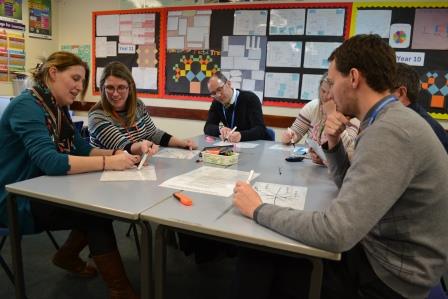Leadership
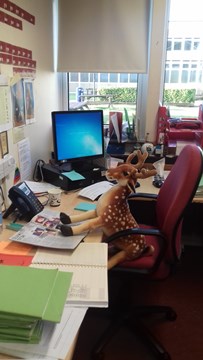
The Senior Leadership Team are researching what the most effective ways are of raising literacy levels for both staff and students, so that staff can be excellent role models and students can achieve their full potential in all subject areas. Staff have participated in literacy training workshops, based on their own personal needs and the DEAR time reading intervention has been rolled out. Students in year 7 read for 30 minutes every day on a rolling timetable, giving them experience reading and developing reading skills across a range of subjects. Their mascot, Derek the DEAR deer, travels to different classrooms as recognition for the staff efforts to develop reading skills, and encourage enthusiasm for reading. Book loans from the library has increased, doubling the amount of books borrowed and with more boys borrowing books. This is a long term plan that aims to see DEAR time across KS3, 4 and 5 in the forthcoming years.
A reading mentors programme has helped Year 7 and 8 pupils with a reading age below 8 years raise their confidence when reading aloud and they have developed positive and supportive relationships with their Year 10 mentors. All students carry a book with them and, if stopped, are able to talk about the book. Reading is a regular part of the school's tutor programmes with all KS3 classes having a library lesson once a fortnight to discuss their reading with their English teacher.
Last week, a team of three year 8 students from Launceston college took part in the Launceston Rotary Club Youth Speaks competition having worked hard since September writing and practising a speech called 'Should school uniform be compolsory?'. The group won 'best on the night' and gained a place in the next round of the competition.
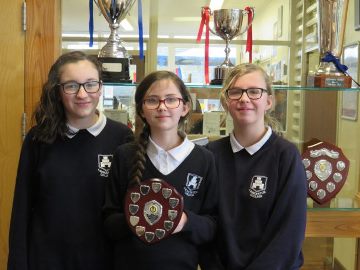
English
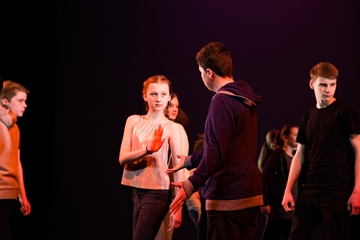
62 Launceston College students performed at Hall for Cornwall in the Royal Shakespeare Company Regional Schools Festival. As the coordinating school for the event, the department have been working collaboratively with students from a range of local primary schools and students from Bideford College to create an ensemble performance of Shakespeare’s Julius Caesar. The complex and politically intricate plot was clearly and dynamically presented across an exciting and well attended evening. It was a great pleasure to see students working together and speaking challenging language in performance with such confidence and skill.
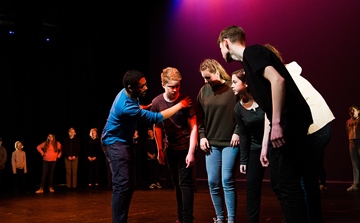
Two students from the department are currently on a work experience placement at Stratford working behind the scenes with the RSC looking at lighting and technical support.
The English department are excited that the Royal Shakespeare Company will be performing at Launceston College on Friday 9th February. The performance will be of Julius Caesar as part of the Royal Shakespeare Company’s Rome Season, exploring betrayal, the responsibility of national leaders, and the lengths people will go to in order to achieve power. This is an interactive ‘First Encounters’ performance designed for ages 7 upwards.
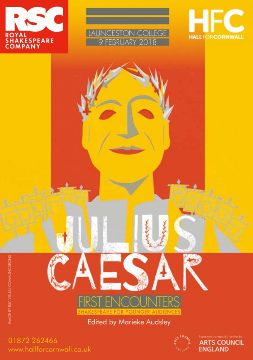
Following a poetry workshop in school with the Causley Trust and Karen Hayes, nine Launceston students and their poems were shortlisted and invited to attend the award ceremony at the festival. For many, this was a new and daunting experience as it meant reading their work aloud to an unfamiliar audience. Despite a few nerves, each of the nine finalists got up on stage and read their amazing poems and received high praise from all those watching. The work from these students was not only highly commended by the audience, visiting poets, judges of the competition and organisers of the North Cornwall Book Festival but they took home the three top prizes in the senior section.
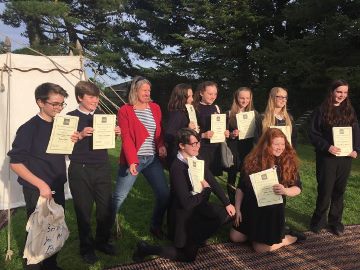
3rd prize went to Tommy Japes for his clever poem which infused humour with emotion.
2nd prize went to Alicia Foster for her moving poem which used some beautiful language.
1st prize went to Cerys Price who wrote a wonderful, moving poem about getting older.
Science
The Science department at Launceston College has been developing a number of different initiatives as part of their work with the Schools Programme. As the department continues to review and amend best practice, they have investigated new learning styles and models for teaching and learning. One of these investigations has led to the discovery of SOLO learning.
SOLO provides a practical framework for looking at the learning process and learning outcomes, without changing what you do. It was described by John Hattie (2013) as "the most powerful model for understanding these levels and integrating them into learning intentions and success criteria". Using SOLO, students and teachers give and discuss feedback more effectively; helping students to understand the level of the task, the level of their achievement, and their next steps for learning. SOLO Taxonomy is a model of learning that classifies students’ learning outcomes from any activity, unit or classroom programme.
Another development within the Science department focuses specifically on Key Stage 4 students and how to ensure best outcomes for all students across the attainment spectrum. This involves a number of individual objectives combining to meet the greater good. The ‘offer’ available to Key Stage 4 students at Launceston College is being expanded to include new GCSE courses and syllabuses. At present, the department offers AQA GCSE Core Science to Year 10 students, AQA GCSE Additional Science to Year 11 students and AQA GCSE Biology, Chemistry and Physics to two cohorts of Key Stage 4 students and AQA GCSE Environmental Science to lower attaining Year 11 students. In September 2016, new GCSE Science courses come online and practice is being adapted to meet these new demands, whilst ensuring the high demand for separate Science at Key Stage 4 (present Year 10 has three classes approx. 80 students) is catered for. A challenge is finding an accessible course for lower attaining Year 10 and 11 students that enables them to succeed to the best of their ability.
One strategy that has been successful over a period of time is the creation of a Fast Track Science stream. Approximately 20 students in Year 10 are offered the opportunity of completing three separate Science GCSE qualifications in a smaller group but in less time. This gives them opportunity to take further GCSE options and has led to fantastic results, high self-esteem and many students going on to study Sciences at AS and A2 Level. Indeed, the one challenge with this group is ensuring the stretch and challenge is available outside of the curriculum. The Science department stretches Year 10 and 11 Fast Track students by giving them extracurricular opportunities. Some of these trips have happened at the start of Year 10 for these students. Already they have attended a SciTech day at the University of Plymouth and later in the year they will attend a DNA day at the Eden Project. Future visits to local universities have also been planned. There are also plans to bring in guest speakers through the Institute of Physics. The Science department has already planned international trips to Iceland.
Modern Languages
These are exciting times for the Modern Languages department. In September, they welcomed new staff who contributed to shaping a strong and enthusiastic team, consisting of native speakers and strong specialists, all sharing the same passion for languages. The department have also welcomed a new Spanish Assistant in September who, alongside the in-house French Assistant, is providing invaluable speaking practice for their students.
The department are continuing their endeavours to make languages more fun and relevant, and it is paramount for them to give students the opportunity to take part in exchanges. In March, they made full use of the school Immersive Learning week to further develop their links with Collège Saint Charles, and their partner school in Guipavas, France. Year 9 students travelled there to meet their partners, get to know their region and experience school life. They came back enriched by the experience and hosted their new friends in June which was equally as successful. The department will be returning to Guipavas in March.
Here is what some of them thought:
" The French Exchange was very good as you get new friends for a lifetime. You also have a great time with friends you know and you will improve your French by doing this trip."
" It was fun. I would recommend it to anyone wanting to do it or wanting to go out of your comfort zone. The food was great!"
The department are also very excited to have made a new partnership with the El Calderónschool in Gandia, Spain. They will be starting a new exchange venture with them this March; students are really eager to meet their new friends and have started to correspond with them already.
They are also taking advantage of this week to enrich the A level course for our 6th form students, as well has providing them with the opportunity to gain some work experience. Having set up links with primary schools in Finistère and Gandia students will be working as Teaching Assistants for a week, immersing themselves in the language and culture.
In addition to these fantastic opportunities, this year the MFL faculty celebrated its first international festival in September. The aim of this festival was to celebrate languages and cultures from other countries as well as raise awareness of the importance of lifelong language learning for everyone. They were overwhelmed by the number of students who decided to compete in this festival. The remarkable quality of the projects and performances, together with the enthusiasm of the students, made it an incredibly successful day and echoed the passion the teachers have for languages. The quality of this year’s projects and performances set the bar very high: from the amazing Taj Mahal made of PVA glue to the impressive singing in Italian, French, German and Romanian and the delicious foreign dishes.
Mathematics
The Mathematics department at Launceston College successfully completed three years of the Schools Programme and wished to continue its successful work with the PTI. The Associate Department scheme offered an additional opportunity for the department to further develop and share its passion and expertise. The department is now in their third year of the Associate Department Scheme and is researching how to develop a more connected approach to the teaching and learning of Mathematics.
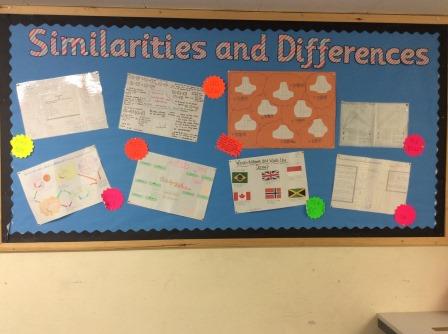
A comprehensive review of the literature surrounding procedural and conceptual understanding has been carried out and a theoretical framework developed which is summarised in the Trubridge and Graham (2013) paper on the BSRLM website.
The department is in the process of engaging with a professional development programme which explores a range of appropriate tasks that focus on making connections. These connections have been developed through exploring similarities and differences, by considering multiple representations and by providing opportunities to develop a more conceptual understanding.
The Mathematics department is now working collaboratively to trial these approaches with their classes and this extended research project is being written up as part of a PhD thesis.
Geography
The Geography department have run an 'Aspiring to A Level' group for Year 11 Geography pupils. These pupils meet on Thursday lunchtimes to carry out a range of enrichment activities such as debating current issues including global terrorism and writing AS Level essays on coastal management. 14 pupils have taken part in this group and it has had a huge impact on A Level uptake. 12 of the 14 pupils have suggested that they want to take Geography in Year 12. Pupils were asked to record their thoughts about attending the group. One pupil said "I enjoyed going into coastal management in more depth [than GCSE] and developing the ability to construct a written discussion".
History
The History department have been involved in a number of interesting initiatives in commemoration of the centenary of World War One. Since 2014, they have been commemorating various centenary anniversaries of key World War One events, such as the Battle of the Somme, the Battle of Passchendaele and in 2018 they will be commemorating the end of the war.
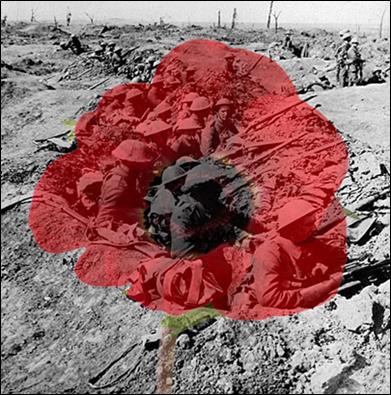
To help teachers and students to ‘never forget’ a Government scheme paid for two students from every school in the country to go on a trip to visit a range of World War One battlefields and memorials with students from other schools, battlefield guides and current members of the British Army.
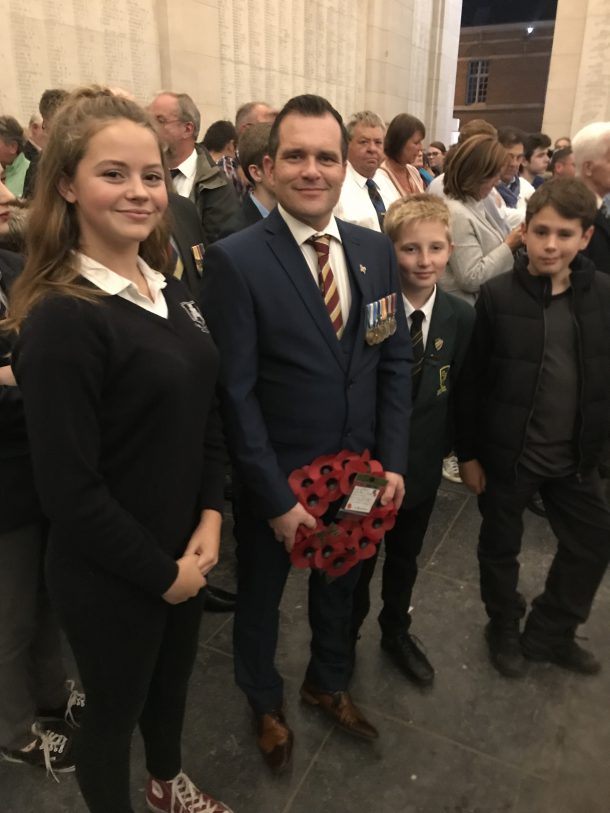
Izzie Pullin, Year 9, and Josh Warburton, Year 8, were the worthy winners of the History Department’s competition asking students to create something on the theme of Remembrance. Izzie painted a beautiful picture of poppies and wrote an academic piece on World War One alongside it. Josh wrote a thought provoking poem that included the final lines “PLEASE tell your friends to put down their gadgets and games, and remember that those brave boys gave THEIR today so WE can have OUR tomorrow.”
The students enjoyed unusually hot autumnal weather as they travelled through France and Belgium visiting key sites including Lijssenthoek Military Cemetery, Zonnebeke war museum and excavated underground trench, Yprs, Langemark cemetery for German soldiers and Thiepval. Highlights included them both having the honour of being chosen to represent the school and travel group as wreath layers at the daily Menin Gate Last Post ceremony in Ypres. They also helped create clay model figures to be part of a national exhibition in Belgium to represent all those who died in Belgium during the war.
Josh and Izzie were worthy ambassadors of Launceston College and were honoured to have been able to attend such an educational and emotional trip that further encouraged their love of history but also made them value the lives they have now.

